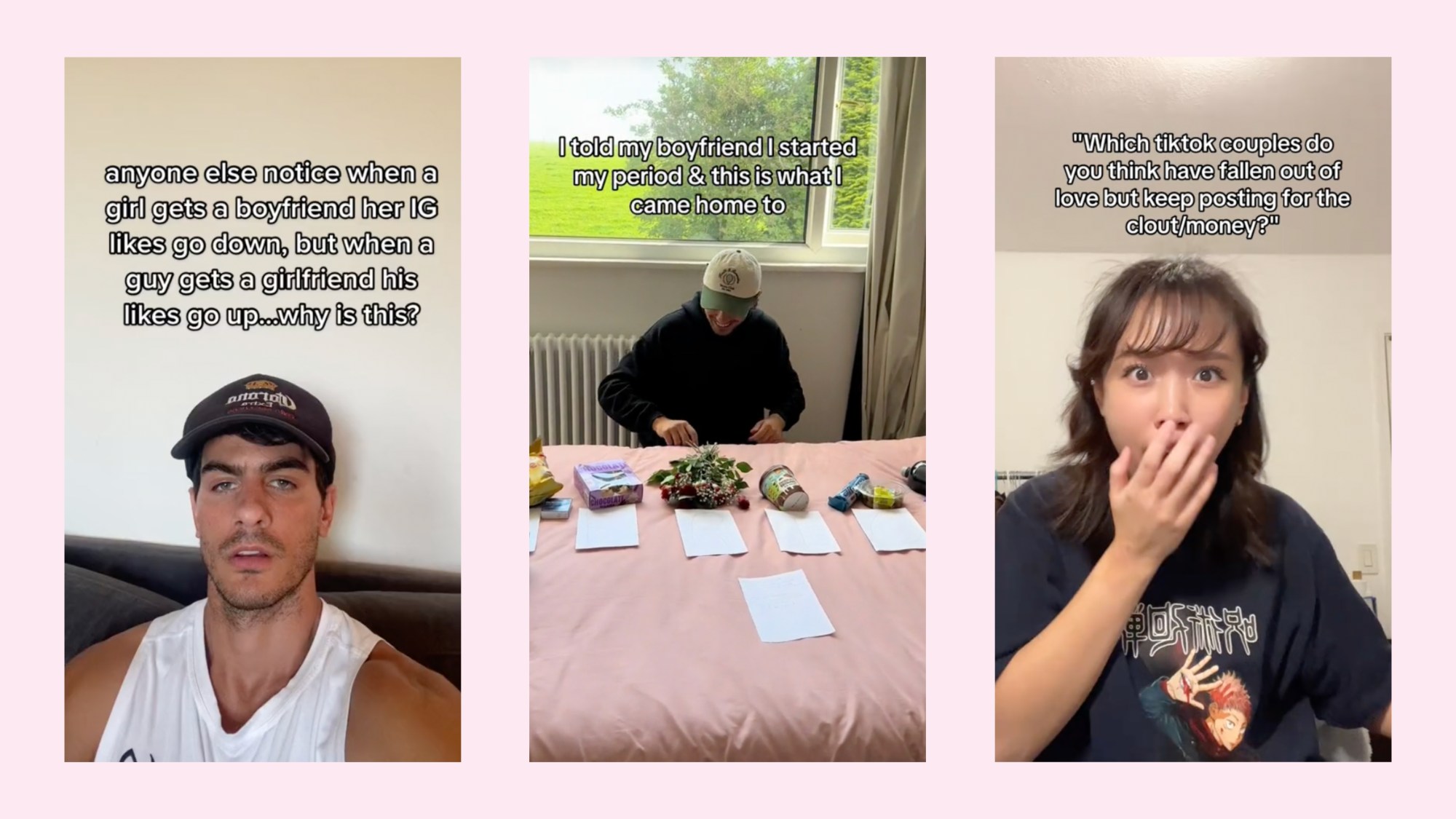Content creator Madeline Argy announced her breakup with rapper Central Cee on the Call Her Daddy podcast two weeks ago. Unsurprisingly, the online response has shared a similar “you were so cute together” template to previous famous splits, based on TikTok videos shared only a few weeks before the relationship ended. While celebrity couples have always garnered a devoted fan base, the rise of relationship content online encourages an even more invested approach to these emotional parasocial relationships (and breakups). And in an internet obsessed with the concept of true love, it’s perhaps unsurprising that a bizarre new subcategory has inevitably emerged — “I love my girlfriend” content. But what exactly is it exactly, and who are these posts even for?
“I love my girlfriend” content differs from traditional relationship content online, where couples share their joint experiences (sometimes even through joint accounts). Instead of telling followers about the thoughtfulness of their partner or sharing your ‘baecation’, the focus is on documenting your positive relationship attributes. When it comes to heterosexual relationships, this can end up meaning that men get likes and comments applauding what some would consider the bare minimum. Whether it’s setting up a camera to share yourself surprising your girlfriend with a gift, videoing yourself making dresses for your girlfriend or documenting your before and after of “the girlfriend effect” (where men develop better style after dating women), the content begins to feel like a weird advert for people who are already in a relationship.
Considering the potential for monetizing relationship content online, it’s a no-brainer that creators would turn their relationship and role as a boyfriend into their entire social media “brand”. Grace Lee, a dating coach based in New York and the founder of A Good First Date, says that monetizing love, however, is essentially inviting another person into the relationship itself. “If the audience wasn’t too thrilled with their last video, he’s gonna light some candles and make her favorite dessert,” she says. “But did he do it because he loves her or because the audience needs more love?”
Grace says that turning private acts of service into public acts of service makes for “great content”. “Super couples like Jalen Noble and Monet McMichael’s relationship-launch video garnered 2.5 million likes and 11.3M views,” she says. “Two days later Jalen posted a paid ad for Coffeemate.” This, she says, doesn’t mean that they are or aren’t in love, but that love is also great content for advertisers. “These influencers are defining what a good boyfriend and a good relationship should look like, in the same way that the 2022 World Cup promotional videos described what it would be like to vacation in Qatar,” she adds.
Despite being in a relationship herself for the past two years, Grace initially avoided posting about her relationship because she always resented that content when she was single. After speaking with friends, she’s found that some relationship content does “give people hope that it’s possible to find love”. So, there’s clearly an argument for sharing romantic moments that you’re proud of, but sharing that you are in a relationship online and building your brand off of your public relationship are clearly two different things — and it can become a slippery slope when considering that the TikTok algorithm often rewards posting about one, hyper-specific topic.
If your first relationship video goes viral, you’re often encouraged to stick to a similar formula for future content. From there, you can end up in a position where your income is interlinked with your relationship status. Considering that a number of influencers who have previously been in public relationships have shared that it wasn’t a healthy or happy relationship once the camera turned off, this only becomes more complicated. Content creator Ashley Taylor, who posted content with another creator William Seremetis before their breakup, recently shared that she felt hypocritical during her relationship. “It doesn’t feel like this,” she said in a TikTok. “This isn’t true. This isn’t all real.”
William has since pivoted his entire TikTok account about being a boyfriend to his new girlfriend (who is also a creator), by posting advice on how to celebrate your girlfriend and videos of him cooking for his girlfriend after she had a “tough day”. While the videos may seem like they are directed at other men, after scrolling through the comments, you find that the audience is majority women. “Put this on his FY page, not mine,” people often write. Since William posted last year about noticing that people get more views when they are in a relationship, the videos can be viewed as an advertisement of what many women feel is missing when it comes to their relationships with men in the age of casual dating — romance, care and thoughtful acts of service.
When it comes to “I love my girlfriend” content, the catch becomes that it presents male kindness as something that is only attainable as long as the man is also profiting off the exchanges, appearance and social currency of a woman. That’s why it pays to ask ourselves if it’s even the girlfriend herself who’s benefiting from the small filmed exchanges. Or if, at that point, we’re all collectively watching a small online business show off its shared portfolio. “If you see a post of two people kissing each other in a restaurant, remember that they had to ask somebody else to take the video,” Grace says. “And after the video was shot, they rewatched it. What could be less romantic than editing a video of a ‘spontaneous’ kiss?”

